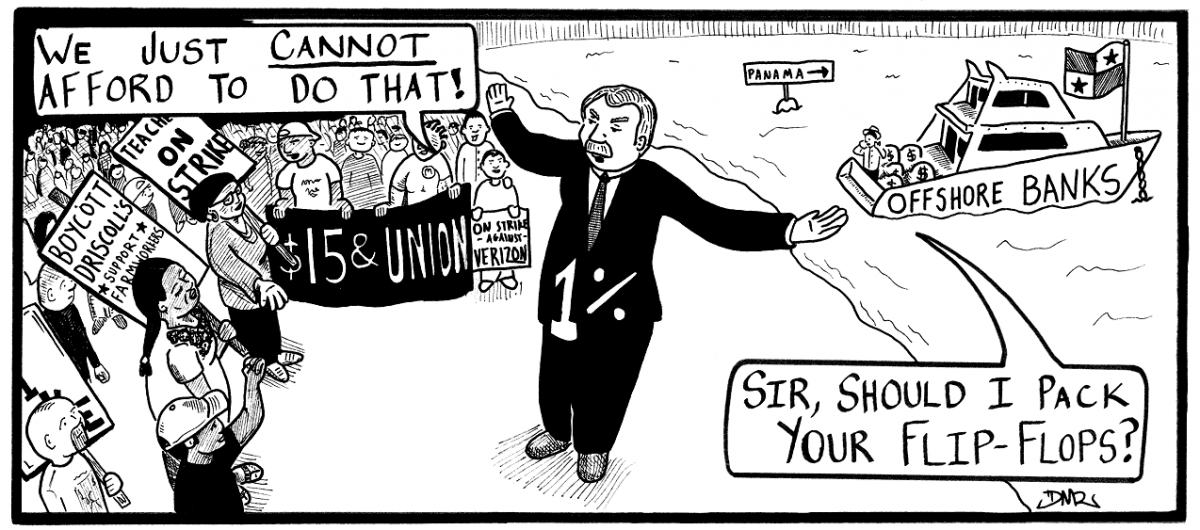Cartoon: Panama Papers Expose Global Elite's Tax Avoidance Schemes

The Panama Papers leak shows how the global elite are bending the rules to hide their money. Click the image for a larger version of the cartoon. Artist: Daniel Mendez Moore.
We’re always being told that the U.S. can’t afford to provide health care or free higher education, and that companies can’t afford to pay a living wage. But could it be that we’re broke on purpose—because the global elite are bending the rules to hide their money?
That’s what’s revealed in the Panama Papers, the largest inside information leak in world history. For more than 40 years, a little-known but powerful Panamanian law firm, Mossack Fonseca, has been working with the global 1% to create “shell companies,” or dummy corporations, for the sole purpose of avoiding taxes.
An unnamed source, John Doe, leaked 11 million documents to the International Consortium of Investigative Journalists, which includes 100 media outlets around the world. The journalists spent more than a year sifting through the files before finally publishing reports on the content of the leak and releasing the first of the documents in April.
The global cost of these tax havens is astonishing. “When global elites can offshore their wealth and big companies can artificially shift their profits to Bermuda, there’s one big loser: the middle class, who has to pay extra taxes to compensate the revenue lost by governments,” said economist Gabriel Zucman, author of The Hidden Wealth of Nations.
“As a result of all the different schemes like the ones being unveiled by the Mossack Fonseca leak,” The Intercept reports, “governments around the world are dealing with at least a one-third of a trillion dollar annual shortfall that must be made up by cutting spending, borrowing, or taxing the rest of us more than they should.”
Already the revelations contained in the Panama Papers have prompted criminal investigations and even toppled governments. Mass protests erupted in Iceland, leading to the resignation of the prime minister, after it was revealed that he and his wife owned an offshore company in the British Virgin Islands. Pakistan’s prime minister and Spain’s minister of industry also resigned, following similar revelations. British Prime Minister David Cameron was forced to admit he had benefited from a tax-avoiding trust fund that his father set up in Panama.
PANAMA ISN'T UNIQUE

SUPPORT LABOR NOTES
BECOME A MONTHLY DONOR
Give $10 a month or more and get our "Fight the Boss, Build the Union" T-shirt.
The law firm also has ties to dozens of wealthy Americans with long histories of fraud and racketeering.
But comparatively few U.S. companies and elites have been named in the Panama Papers—because they have access to tax havens right here at home.
The state of Nevada, for instance, has no income tax, and has laws that shield companies from having to be transparent about their operations. So it’s another place where the superrich like to set up shell companies.
In fact, Nevada is listed alongside Panama, the Bahamas, and the British Virgin Islands in the International Consortium of Investigative Journalists’ list of 10 most popular tax havens.
